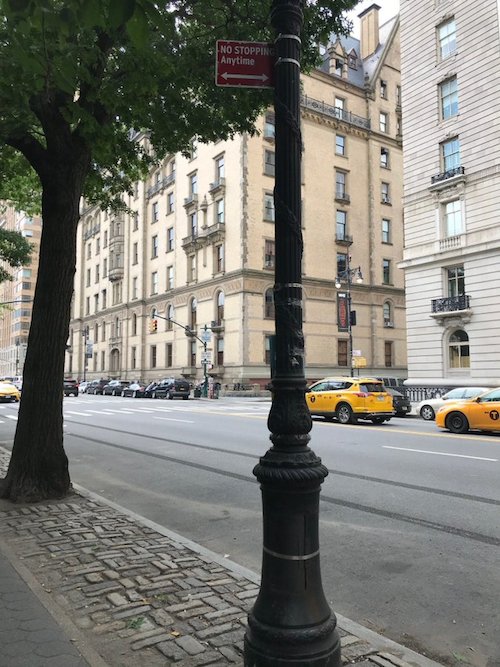Book Culture, which operates two stores in the neighborhood, warned last month that it could go out of business without some sort of financial lifeline. And while store co-owner Chris Doeblin said he had some positive initial conversations with politicians, the store updated customers on Wednesday that “it has become clear that no city or state action is likely to occur soon, or at all, to assist Book Culture.”
So it’s relying on the community for help — not just by asking them to buy books, though that would be nice too. Book Culture is using a community lending model that asks people to lend money for five years at a 4% interest rate. People who want to lend have been urged to email lenders@bookculture.com or chris@bookculture.com and ask for a loan contract. The store’s website says that it needs $750,000, and that it will be profitable in 2020 with access to the credit it needs. As of Wednesday, 34 “sponsors” had raised a total of $140,000, or 19% of the total needed.
There has been mixed reaction to Book Culture’s crisis among West Side Rag readers, with some commenters criticizing Book Culture’s past treatment of workers — the store fired workers in 2014 after a union vote, but then rehired them after an outcry. Doeblin also has blamed a state minimum wage hike for some of the store’s business difficulties. In response to a question about his stance on employee compensation, Doeblin wrote “I think the contribution the stores makes to our communities stands for itself.”
He says that progress has been steady on getting community members to loan them money. “We are steadily receiving new pledges and the proceeds from previous pledges which is extremely uplifting,” the Facebook update says. But time is apparently short.
“The next few weeks are a hugely important period for us if we want to continue operating for the fall as we have in the past. This includes what we can provide for the opening of the university semester and the recommencement of our busy events season.”










One of the best stores on Colombus. Shame that stores like these have to beg for help to stay open but the truth is we live in a digital world today. I think there needs to be a new retail experience for book shopping. Everyone’s looking for an experience now. Why not try something new?
No. If you can’t run a viable business you close it. You will be a true businessman if you can figure out what will work on the UWS. This guy was doomed the minute Amazon sold the first book.
I only loan money to people that can pay it back. What Book Culture is asking for is a gift so it can stay open for a few months before going out of business.
Book Culture is on life support because it can’t sell enough books to meet its expenses, namely rent and payroll.
How is a cash infusion going to save this store?
If a business model doesn’t work the cash from these loans will quickly burn up. These loans will simply delay the inevitable.
If Book Culture was a healthy business it could get the cash it needs from a bank or a reputable investor. It wouldn’t have to resort to a “community lending model”.
Is it not clear that this business does not work – not under the current model/reality?
Mr. Doeblin has some balls to be asking for money and blaming anyone and everyone but himself and his business partners for the situation they find themselves in. I would give Mr Doeblin all the credit if his business was thriving. By the same token, I give him all the blame for it failing.
Has Mr Doeblin thought about moving to a lower cost space, closing some of the locations, cutting back on staff, changing the inventory, providing better service,…Has Mr Doeblin asked a lender for money – that is usually how things work; you ask a bank for a loan not the people in your neighborhood.
Btw a 4% loan is completely ludicrous. Unless he is willing to put up $750,000 in collateral, there is no way he should get a 4% loan. People barely get a 4% on a mortgage for an apartment in NYC that tends to retain its value. 4% on a risk loan is outright wishful thinking.
What contribution exactly does Book Culture make the to the community? Do they provide free after school programs? Do they donate hundreds of books? Or do they simply sell books at a higher price than you can get elsewhere?
I love how Mr Doeblin is trying to say that by selling books – and house trinkets – that he is doing God’s work. How about restaurants and delis and supermarkets who feed people. How about pharmacies who provide cures for people. Or clothing stores that keep people warm and clothed.
Wait, is Book Culture a for profit business or a nonprofit community center?
Yes, it is sad when stores close. Yes, it adds to empty storefronts. But we are a capitalistic economy.
Donations? If the community does not buy the books or patron the store, haven’t they spoken? “Sorry Amazon is cheaper” says no one but what most do.
Is he offering a personal guarantee for these loans?
Don’t know why Mr. Doeblin just doesn’t join the long list of NYC small business owners and start a GoFundMe page.
As for “no state or city” action forthcoming, what did Mr. Doeblin expect?
BdeB and city council already are spending huge sums of taxpayer money on “loans” (which are rarely repaid) for people facing eviction (sometimes more than once), and other progressive causes. But even that largess has limits.
While it does seem as if BdeB and Corey Johnson forget at times, they are spending other people’s money. You can’t save everyone.
What about a small group/board of investors with a common vision to preserve the value of books, importance in the community, and a thriving small business. The group might consist of authors, professors, obviously the owner, and maybe others who recognize and appreciate the contribution within the community.
These are different times, the landscape (including the financial ground) is changing and requires us to think differently.
They have that. It’s called the NYPL and it is grossly underfunded.
Thinking idealistically, I agree with comment 9 below. Practically speaking, can’t Mr. Doeblin figure out another form of investment without asking for a loan? What am I trying to say — I think I’m thinking of the same model a company has when it goes public and offers stock. But his enterprise is underfunded already … Well, just thinking out loud. Any investment would have to offer some kind of real return to investors, and it does appear that the owner is seeking more of a gift or donation than a loan, the payback of which appears doubtful.
How about a loan from a bank?
Banks might do this, but it would be a high yield, risky loan at a rate much higher than 4%.
IIRC Mr. Doeblin already has extensive debt, that is one reason why he’s in such a tight spot. What revenue that is coming in must go in part (what percentage I don’t know) to servicing debt.
Next, getting a small business loan is neither always easy, fast nor cheap.
As with consumer debt lenders prefer to give money to businesses that don’t appear to need. That is extending a line of credit when business pretty much is easily paying bills/dealing with CODB from revenue, and maybe having something left over each month.
Depending upon source small business loans may require collateral.
Mr. Doeblin rents is stores so there isn’t a property to use as collateral. What he does have is same as other retailers; inventory, which is a rapidly depreciating asset. All those books and other merchandise might be worth $500k today, but six months later that value could be one-third or more less. Over say a ten year lifespan of a loan that merchandise could lose half or more value. No one wants that….
My guess is Mr. Doeblin already has his answers from banks and other more regular sources of lending. Hence his appeal for the city/state to pony up, and or for investors or “private” sources of lending.
One area where consumer and business lending overlap is no one wants to give money to someone who is drowning. If they do rates/terms are going to be high and harsh to reflect risk.
I’m guessing no bank is going to want to invest without a better business plan.
Here’s the problem.
No one likes throwing good money after bad.
Some one with juice and savvy probably could get Google, Facebook, JP Morgan, Goldman Sacks, and the scores of others to pony up into some sort of investment fund for struggling small NYC businesses. Sort of like a “Lending Club” type of thing.
However just giving a failing business (whether owner wants to recognize this or not) is charity, not a business financial model that can be sustained.
https://www.nerdwallet.com/blog/small-business/how-to-get-a-small-business-loan/
But wait, both federal and local governments (including NYS/NYC) already have various small business loan schemes:
https://www1.nyc.gov/nycbusiness/description/sba-7a-loan-program
https://www.bfscapital.com/business-funding/small-business-loans/new-york-business-loans/
Problem for many small businesses is same as for many consumers; they cannot afford to take on debt. What they really need is some sort of instant income (grant, investor, etc…), something that isn’t going to add yet another bill to pay each month.
Mr. Doeblin’s problem is like many other businesses; revenue simply isn’t covering expenses/CODB and he’s operating at nor near a loss each month. Piling on more debt means he will have even less each month as that new debt must be serviced.
There are really only two ways out of this situation absent an infusion of cash. Cut losses and shut things down. Or something happens and going forward monthly sales revenue increases meaning the business can remain afloat.
There is a third; file a reorganization bankruptcy and try to work out better terms via that process with creditors. This can backfire as creditors can balk and demand things be shut down/sold off to get their money now.
P is for Palestine.
Public money should not subsidize private businesses. And I say this as an owner of several private businesses.
Why not? City subsidies private individuals in all sorts of ways including providing funds (loans that aren’t always repaid) to cover delinquent rent.
Columbia should support Book Culture since most of the students purchase their class books there.
Went through this first time around with WSR reporting on Book Culture’s woes.
Mr. Doeblin acknowledged in various interviews Columbia University (who is his LL for at least one store) has been very generous and accommodating.
However things still are what they are; BC cannot generate revenue from both stores to keep afloat.
Worse Columbia students and faculty just like those associated with any other college/university have embraced online.
Many textbooks and other course offerings are now online. In fact if you’ve noticed what once was a fairly common sight, and profitiable business model; bookstores in or near college/university campuses has slowly dwindled, again thanks to Mr. Online.
Barnes and Noble once had that huge textbook book store on Fifth and 18th where students from NYU, Baruch, and pretty much every college/university would go to find required texts. B&N closed that place years ago.
In all forms print media is dying a slow death. It will still be around obviously, but not in ways things once were in past.
Unlike ourselves, our children, grandchildren or great grandchildren don’t have to haul around arm fulls of text books. Books, syllabuses, assignments and so forth now increasingly are online.
Syllabi, not “syllabuses”.
The tenor of his emails have been ridiculous. I love bookstores and supported Book Culture, but I am very disturbed by his sense of entitlement. In his earliest emails, he said the city should give him a loan — ie, taxpayers should subsidize his for-profit business and pay for the mere privilege of having book culture in our neighborhood. That’s even though the business was “doing well” in his words. So if the villains are Amazon and the minimum wage hike, how is a short-term cash infusion going to fixed a flawed business model?
As we learned from the example of Hex & Co. this business owner has to start innovating. He needs five businesses not one to survive. There are a lot more smart people on this blog than me but certainly he could add a cafe to his Columbus store. He could offer tutoring in reading and writing for middle school and HS. He could charge admission for conversations between thought leaders and authors. He could host and charge for book groups led by authors. He could partner with a cruise line and package all star university professors giving lectures on the high seas… Should he have done all this ten years ago? Yes, but he can start today as well.